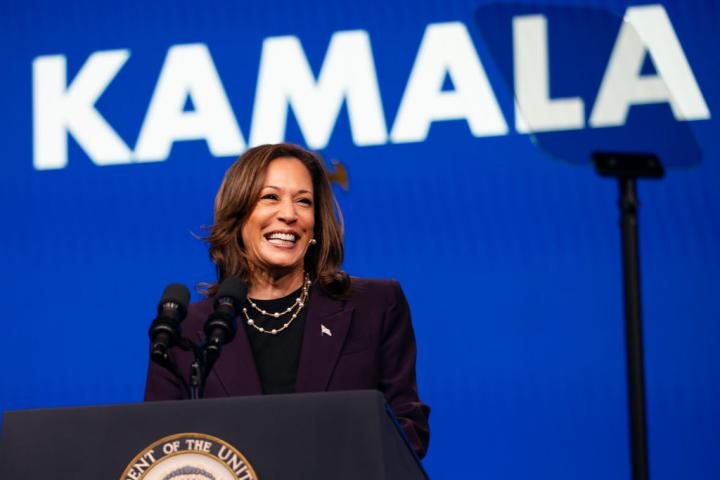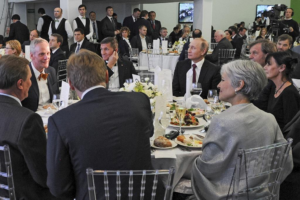
The argument that “Nobody voted for Kamala Harris, so why is she running? How is this a democracy?” has been circulating among some critics of the Vice President. However, this claim is rooted in a misunderstanding of how U.S. elections, party nominations, and the role of vice presidents work. Let’s break down why this statement is inaccurate.
Understanding the Role of Vice Presidents
First, Kamala Harris is currently the sitting Vice President of the United States. She wasn’t just handed this position out of nowhere. In 2020, over 81 million Americans voted for the Biden-Harris ticket. The key here is that when Americans vote for a presidential candidate, they are also voting for their chosen vice president. So, when Joe Biden was elected president, Kamala Harris was elected alongside him as vice president. That’s how the system works.
Claiming that “nobody voted for her” is misleading. The American electorate knew full well that if something happened to Joe Biden, Kamala Harris would step in as president. This is a standard expectation under the U.S. Constitution, and every voter in 2020 was aware of this fact.
How Delegates and Party Conventions Work
Some critics argue that because Harris wasn’t the top candidate in the 2020 Democratic primary, she shouldn’t be considered as a viable presidential candidate now. But that’s not how the system functions. If a sitting president steps down or decides not to run, the party can choose a new candidate, often through a party convention.
When people bring up claims like “she wasn’t on the ballot” or “her name doesn’t appear on public poll records,” they are misunderstanding the party’s nomination process. Delegates are initially bound to their state’s primary winner, but if the situation changes, those delegates can shift their support to another candidate during the party convention. This is how party politics works in a democracy.
If Biden were to step down, Harris would almost certainly become the Democratic nominee, not because she’s “taking over,” but because she is the natural successor as vice president. The Democratic Party would hold a convention, and if Harris garners enough delegate support, she would become the candidate.

Harris Has Earned Votes Throughout Her Career
Another point worth debunking is the notion that Harris has never won any votes. This couldn’t be further from the truth. Let’s look at her record:
- In her first election for California Attorney General, Harris received tens of thousands of votes in the primary and then more than 100,000 in the general election.
- She ran for the U.S. Senate in 2016 and won with over 10.5 million votes.
- At the 2020 Democratic National Convention, Harris was selected as Biden’s running mate with broad support.
- In the 2020 presidential election, the Biden-Harris ticket received over 81 million votes—more votes than any presidential ticket in American history.
To say that nobody voted for Kamala Harris simply isn’t true. She’s been a public servant for decades and has earned millions of votes in her various elections.
The GOP’s Argument About Age and Experience
Some opponents argue that the only reason Harris is being considered as a potential presidential candidate is because of Joe Biden’s age. This criticism often devolves into thinly veiled attacks that suggest the U.S. “isn’t ready for a woman president,” or more subtly, “she isn’t qualified.” These claims are often politically motivated and play into broader narratives meant to undermine Harris.
While it’s true that Biden’s age is a frequent talking point in GOP campaigns, it doesn’t negate the fact that Harris has proven her ability to win votes, govern, and hold high office. Dismissing her as unqualified simply because she’s not the first name on the 2020 presidential ballot is not only disingenuous but ignores the role of the vice president in American democracy.
Is This Argument Anti-Democratic?

Ironically, the claim that Kamala Harris shouldn’t be running is, in itself, undemocratic. Harris was elected alongside Biden by millions of Americans who understood that she could potentially take over in the case of Biden’s departure. If Biden decides not to run in 2024 or steps down, Harris has every right to run for the presidency. The Democratic Party’s internal processes will allow its delegates and members to choose who they support at the convention.
To say this is undemocratic ignores the fact that political parties are democratic institutions. They make their choices based on delegates, votes, and support from their members. The claim that Harris should not be running because she wasn’t on the 2020 primary ballot reflects a misunderstanding of how party nominations work.
Why This Claim is Misleading
In conclusion, the argument that “nobody voted for Kamala Harris” and that her candidacy is somehow undemocratic is not just wrong—it’s rooted in a lack of understanding about how the U.S. political system functions. Harris has received millions of votes in her career, and the Biden-Harris ticket was elected in 2020 with full knowledge of the role Harris would play if Biden were to step down.
If you want to talk about democracy, let’s stick to the facts. Kamala Harris was elected by the American people as part of the 2020 presidential ticket, and she has every right to run for president if the situation calls for it.





